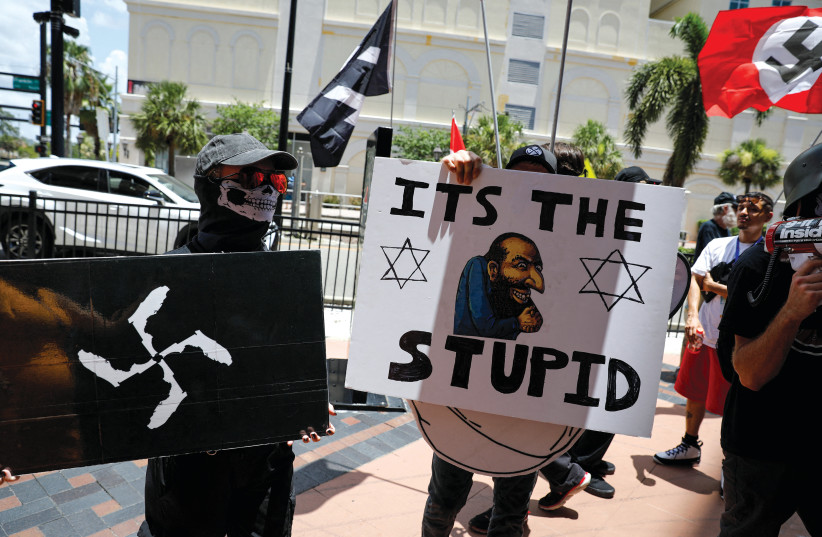In 1998, Auschwitz survivor and Nobel Peace Prize laureate Elie Wiesel said: “As a Jew, I need Israel. More precisely: I can live as a Jew outside Israel but not without Israel.”
Arguably, this statement, more than many others, encapsulates the strong, dependent nature of the Israel-Diaspora relationship at the end of the 20th and beginning of the 21st century.
It is a relationship whereby the Jewish state would be seen as the guarantor of security, rights, and freedom for Jews around the world. A Jewish state would not only advocate and lobby for their safety, but it would provide world Jewry with a sense of protection, knowing that they have a haven to run to should the situation become untenable in their countries of residence.
Nevertheless, there were those who initially felt the pogrom of October 7 shattered this illusion, that Zionism had lost a central part of its raison d’être.
This could not be further from the truth.

Majority of Israelis believe Israel is safest for Jews
According to a recent survey by the Center for Jewish Impact (CJI) and Geocartography Knowledge Group in December, it became clear that, even amid the war and despite the October 7 massacre, the threats against Israel are not perceived as more dangerous than the rampage of antisemitism worldwide.
In fact, 87% of Israeli respondents agreed with the statement that “the safest place for Jews is Israel despite the security situation, and therefore the Jewish Diaspora should make aliyah to Israel.”
The finding presents a consistent increase over time in this attitude (82% in 2022 and 76% in 2020). It proves that Israelis perceive antisemitism worldwide as more dangerous than Israel’s security situation and Israel as the safest place for the Jewish people, even during wartime.
This is quite an amazing statistic, but it is one borne out by reality and baked into the Zionist cause. The case for modern political Zionism was revolutionary and caught many Jews off guard in the 19th century.
Zionism and modern antisemitsm
Jewish emancipation was only a few decades old and many Jews felt the sweet thrill of being officially granted full rights in many of the societies they lived in, particularly in central and western Europe.
HOWEVER, MODERN antisemitism was only gathering steam. Even the term itself would only be coined by German journalist Wilhelm Marr in 1879, to describe his own form of prejudice.
Zionism was certainly not the default position for the majority of European Jews well into the middle of the 20th century, but the Holocaust changed all of that.
The annihilation of six million Jews shook the world to its core, and certainly altered many people’s perceptions about the call to reestablish Jewish sovereignty in its ancestral and indigenous homeland. The rights, freedoms, and safety many Jews felt were illusory.
Despite wars, boycotts, regional exclusion, and global delegitimization of the Jewish State, immigration to the State of Israel has continued unabated for the last 75 years. There is an inherent understanding that Israel’s open-door policy toward the Jewish People is not just an embrace but a helping hand.
The butchering of over 1,200 Israelis on Simchat Torah was a massive blow to many Israelis’ sense of security. It was a shock to the system of the Jewish State’s military, which did not envision in its wildest dreams that such an attack could take place with so much bloodshed and destruction.
For many Jews looking on in Israel and around the world, it shook the foundations of Zionism.
HOWEVER, THESE foundations have demonstrated that they are strong and robust. The Jewish people have witnessed that, as opposed to generations passed, when we are hit, the Jewish state will respond with a moral and devastating force to ensure that the massacre can never be repeated.
These are actions that our ancestors could never countenance, and it is this resolute fortitude in the face of an attempted genocide that has ensured that Zionism has not just been fortified, but emboldened.
This resilience has been compounded by the shocking rise in antisemitism around the world – in many cases, by hundreds of percent, even in places thought to be relatively immune to Jew-hatred.
Israeli Jews have seen unprecedented evil mere kilometers from their homes, towns, and cities, and they still believe their situation is far preferable to that of their co-religionists around the world.
Meanwhile, Jews around the world are being told, sometimes by well-meaning friends and frequently by nefarious foes, that they are being attacked and targeted because of what Israel is doing.
This is an outrageous lie, and as monstrous and deceitful as its corollary that antisemitism exists because of Israel’s actions. Of course, this ignores millennia of Jew-hatred. It is stated to provide an insidious justification for antisemitism, but also to try and drive a wedge between Israel and the Jewish Diaspora.
Nevertheless, it will not succeed. Every antisemitic attack merely deepens the ethical justification of Zionism and the endurance of the Jewish State. It demonstrates why we need a Jewish homeland.
As our poll shows, Israelis intuitively understand that, and a growing number of Diaspora Jews understand the words of Wiesel, who experienced the greatest inhumanity to man in modern history, that the State of Israel is the only guarantor of Jewish rights around the world.
The writer is the chairman of the Center for Jewish Impact, and a former CEO of the World Jewish Congress.
